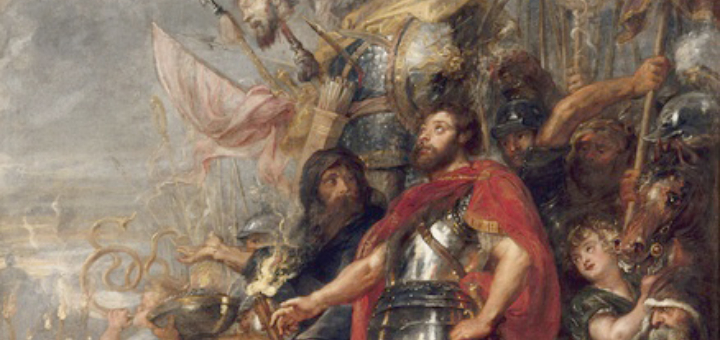
 Peter Paul Rubens and workshop [Public domain], via Wikimedia Commons. Text added by author.[/caption]Right after the scandals about former-cardinal McCarrick broke, the first reading at Mass was from Jeremiah 23:
Peter Paul Rubens and workshop [Public domain], via Wikimedia Commons. Text added by author.[/caption]Right after the scandals about former-cardinal McCarrick broke, the first reading at Mass was from Jeremiah 23:
"Woe to the shepherds who destroy and scatter the flock of my pasture — oracle of the Lord. Therefore, thus says the Lord, the God of Israel, against the shepherds who shepherd my people: You have scattered my sheep and driven them away. You have not cared for them, but I will take care to punish your evil deeds. I myself will gather the remnant of my flock from all the lands to which I have banished them and bring them back to their folds; there they shall be fruitful and multiply. I will raise up shepherds for them who will shepherd them so that they need no longer fear or be terrified; none shall be missing."There were plenty of people who pointed out this verse, commenting on how the timing of the revelation seemed to fit perfectly within the timing of the liturgical calendar. And while many people have been on the verge of despair, with some high-profile Catholics announcing that they're leaving the Church, I have been recalling the Old Testament and drawing hope from it. One of the things that Lee Strobel found interesting when he began to read the Bible is that the Old Testament is filled with stories about how horrible the Israelites acted. They are God's Chosen People, a special possession of the Lord, and yet again and again they deny Him, returning to worship false idols. They intermarry with pagans and adopt pagan worship. They defiled the Temple. They hid the fact that they were Hebrews. They put prophets to death who called them to repentance. But the Chosen People were still the Chosen People, and God promised that He gather the sheep and bring them back to His fold. He promised that He would raise up good shepherds for his sheep. Again and again in the Old Testament, the Israelites would fall into sin and again and again, God would chastise them and then promise He would still care for them and bring about upright leaders. The scandals that seem to grow every morning as we wake up and check the news can make us feel hopeless. They might tempt us to despair. They might make some people leave because of the horrible pain that they have suffered within the Church. When someone who says he speaks for the Lord hurts you, it's not hard to see why a person would turn away from the Church. Each of us is reeling with every new revelation. But if every morning seems to bring new scandals and horrors, we must also remember that God's mercies are also new every morning. And God is bigger than all of this. Through centuries of unfaithfulness, the Israelites knew that they would still be able to come back to God. Those who were faithful knew that God was still with them, even as they were invaded and conquered and exiled into foreign lands. We, too, must hold on to God. Our faith must be put in Him -- not in human beings. We must remember that we are followers of Christ, not the bishops. Yes, the bishops are our spiritual leaders, but they are not Christ. We can look to the Old Testament Israelites who wanted to be faithful, yet were surrounded by sin among their own people, among their kings, among even their priests. We can look to the Maccabees for inspiration, as well. Judas Maccabeus and his brothers were the sons of the priest Mattathias, and they led a revolt in an effort to regain control of the Temple and cleanse it from the pagan sacrifices that had been going on there. We, too, must work for the cleansing of our Church -- ridding Her of what Pope Benedict XVI called "filth." Our work can't just be letter writing and working to change policies and pushing to remove those embroiled in the scandals, though. We must also work on a spiritual level: fast and pray and make sacrifices and mortifications. Being Catholic means embracing the Cross, just as Jesus did. Sometimes it means bearing our suffering well, and sometimes it means willingly making sacrifices in reparation for the sins of the world. To be honest, all of this is so very overwhelming that I have been praying more than anything. And I've been looking at every prayer I say and every Scripture I read with new eyes. I've looked for consolation and have found it in the rhythms of the liturgical cycle and the Liturgy of the Hours. Sometimes, the songs we sing at Mass look completely new to me, too. As we each try to find our way through this mess, perhaps we can remember the words of Isaiah:
Then I heard the voice of the Lord saying, “Whom shall I send? Who will go for us?” “Here I am,” I said; “send me!”https://www.youtube.com/watch?v=4t6mz8yoocY
For a great study on the Bible that takes you through the Old Testament (and the New), check out the podcast on Understanding the Scriptures, a textbook by Dr. Scott Hahn. Read my review of that podcast series.
Copyright 2018 Christine Johnson
About the Author

Christine Johnson
Christine Johnson has been married to Nathan since 1993 and is the mother of two homeschool graduates. She and Nathan live in the Blue Ridge Mountains of Southwest Virginia, where she tries to fit in as a transplanted Yank. She blogs at Domestic Vocation about her life as a wife, mother, and Lay Dominican.


.png?width=1806&height=731&name=CatholicMom_hcfm_logo1_pos_871c_2728c%20(002).png)
Comments